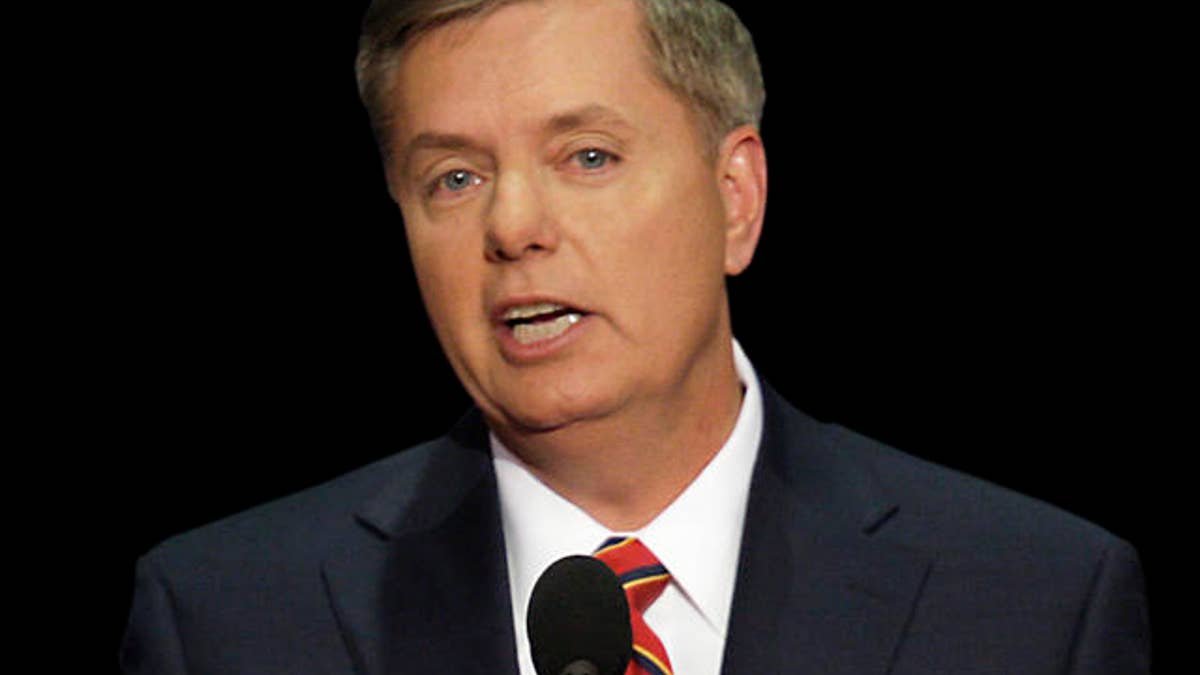
Sen. Lindsey Graham, R-S.C., speaks at the Republican National Convention in St. Paul, Minn., Thursday, Sept. 4, 2008. (AP2008)
Sen. Lindsey Graham, R-SC, vowed Wednesday to block every Obama Administration nominee until he secures federal matching funds for a scope study to dredge the Port of Charleston, something the senator and many in the Palmetto state have said is crucial for exports brought in on super cargo ships. The president's 2011 budget included no funding for the port, and though Graham fought, with help from the Administration, to get the money into the long-term funding resolution, the senator said House members balked.
"When people get focused on it, I think (the problem) will get solved. This is a way to get them focused," Graham said, noting that some 260,000 jobs in his state are tied to the port.
Speaking at a press conference in Charleston Tuesday, Graham first mentioned his objection saying he would "tie the Senate in knots" over the issue. But Graham made clear Wednesday that did not include an upcoming vote to fund the government.
More than 185 nominees are currently pending, according to the White House nominees website, including Solicitor General, the Assistant Secretary of Energy in charge of nuclear energy, the Deputy Attorney General, and the director of the Bureau of Alcohol, Tobacco, Firearms, and Explosives.
The Graham objection prompted a call from Vice President Biden. "He said, ‘What can we do to help?'" Graham recounted, saying the White House is now looking at having the Army Corps of Engineers essentially reprogram the money for the study, eliminating the need for an appropriation from Congress. "(Biden) tried to help me in the negotiations" over the long-term funding bill, "but this is a House problem, not a Senate problem," Graham said, presumably referring to House Republicans.
Graham said he would remove his objection when the federal money, which he estimated was "about $40,000," is made available for the feasibility study which would pave the way for dredging the port to 50 feet. Future funding is not tied to his current demand. The senator said he would like to see a "pot of money" created "that would be available to ports that need to be expanded, because the Panama Canal is going to be deepened. And let the Army Corps make the decision based on merit."
As for whether this violates the GOP pledge to ban all earmarks for two years, a policy now in place Congress-wide, Graham said, "Twelve ports would be affected, not just one. That's not an earmark. It's allowing infrastructure to be developed that has to be developed for America to be competitive in the world economy. IF we don't deepen our ports, then these ships have no port to come to and you lose market share."
In the current epic squabbles over spending cuts, Graham is clearly fighting an uphill battle, but senators wield an enormous amount of influence over the nominations process. Any one senator can grind that process to a halt in order to get what he or she wants.
"I am planning to make sure that the Congress and the Administration acts responsibly when it comes to job creation in my state," Graham said. "I'm not going to sit on the sidelines and watch the Port of Charleston fail, because people are making irrational decisions. I hate creating problems for any colleagues, but this is the number one issue for me back at home."




